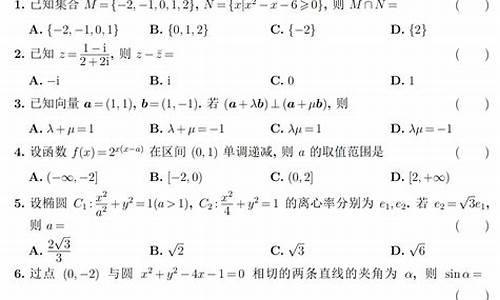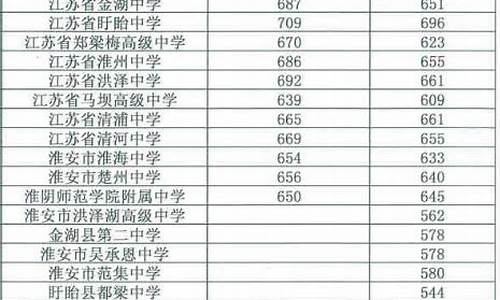您现在的位置是: 首页 > 教育趋势 教育趋势
近三年高考情态动词试题_2013情态动词高考真题
tamoadmin 2024-06-17 人已围观
简介1.对将来的推测可以用哪些情态动词2.高考英语 情态动词3.高考英语语法:高考英语总复习语法专项 情态动词4.情态动词could与must表推测时反意疑问句一样吗.高手进,5.关于情态动词+have done 的反意疑问句的问题。。。6.情态动词的高考考点情态动词老师叮咛:李辉老师说,“一切的道理比不过三个字,‘我愿意!’。”情态动词这个部分虽然并不在高考中占据很大的分值,但是掌握情态动词应当是一
1.对将来的推测可以用哪些情态动词
2.高考英语 情态动词
3.高考英语语法:高考英语总复习语法专项 情态动词
4.情态动词could与must表推测时反意疑问句一样吗.高手进,
5.关于情态动词+have done 的反意疑问句的问题。。。
6.情态动词的高考考点

情态动词
老师叮咛:李辉老师说,“一切的道理比不过三个字,‘我愿意!’。”情态动词这个部分虽然并不在高考中占据很大的分值,但是掌握情态动词应当是一个愿意把英语学好的人所必需的。下面的内容就为大家讲解了表示推测的情态动词。本文经过了全网首席高考英语名师李辉老师团队高度认真的整理校对,无错、可信!可供全国各省高中生打印、背诵!
情态动词must, can / could, may / might均可表示推测,它们可以对过去、现在或将来的情况作出语气强弱不同的推测。在运用情态动词表示推测时,我们应该着重把握以下两点:
1. 把握推测语气的特点,选择恰当的情态动词。
(1) 表示肯定的推测时,各情态动词语气从弱到强依次为might→may→could→can→must;表示否定的推测时,can’t / couldn’t语气较强,意为“不可能”;may not / might not语气较弱,意为“可能不”。
注意must的否定形式mustn’t不表示否定推测,而是表示“不许可”或“不应该”。
(2) 情态动词表示推测时,在用法上有一些限制:
l must只用于肯定句中,意为“一定,准是”。Eg:
They have been working hard all day. They must be tired.
l can多用于否定句或疑问句中,could可用于各种句式。Eg:
Can the story be true?
Simon can’t be at home, for I saw him going shop-ping just now.
You mustn’t smoke when you are walking around in the wood. You could start a fire.
l may / might用于肯定句和否定句中。Eg:
It may or may not rain. I’m not sure.
Peter might come with us tonight, but he isn’t very sure yet.
2. 确定被推测时间,正确判断动词时态。
(1) 对现在或将来的情况进行推测时,用“情态动词+do”。Eg:
Mr. Reed looks pale. He may be ill.
If you don’t have a guide, you could lose your way.
(2) 对此时此刻正在进行的情况进行推测时,用“情态动词+be+动词-ing形式”。Eg:
At this moment, our teacher must be correcting our exam papers.
He could be doing his homework in his room now.
He may be waiting for you now.
(3) 对过去的情况进行推测时,用“情态动词+have+过去分词”。Eg:
The road is wet. It must have rained last night.
Mars couldn’t have watched TV yesterday for he knew they would have an exam.
He didn’t come to school yesterday. He might have been ill.
拓展在特定的语境中,“might/could+have+过去分词”不是对一件事情是否发生进行推测,而是表示本来可能发生但没有发生,或者本来可能完成却没有完成的动作,有时具有一定的感彩。
l might have done本可以做(却没有),有时表示很委婉的责备。Eg:
You might have phoned me, though you were busy then.
l could have done本可能做(却没有)。Eg:
He could have caught the early bus, but he was delayed by helping a stranger.
即学即练用must, can/could, may/might及括号内动词的正确形式填空。
1. —Where is David?
—He ________ (be) at school. Classes begin at 8.
2. I’m absolutely sure! They ________ (arrive) yesterday. I saw their tickets.
3. Are you joking? Mark ________ (go) to Paris. He doesn’t have enough money.
4. They ________ (live) in New York, but I’m not sure.
5. The concert ________ (be) wonderful last night. Fiore is a great conductor.
答案:
即学即练
1. must be
2. must have arrived
3. can’t have gone
4. may/might/could live
5. must have been
对将来的推测可以用哪些情态动词
情态动词表示主语做某动作的可能,意愿,必要,也称为能愿动词。其包括能/能够(can)、会(can/will)、该/应该/应当(should)、配/值、宁可等。
其特点是以实义动词作为补语。应当注意不同语言的情态动词没有严格的一一对应关系。有些在汉语中是“情态动词+动词”的表达在其他语言里是“实义动词+动名词作宾语”。
现代汉语的情态动词有:能、能够、可以、会、可能、敢、肯、愿意、情愿、乐意、想、要、应、应该、应当、该、值得、配、好、一定、必须。
扩展资料:
用“情态动词+have +done”结构表示对过去动作的推测,高考试题中常用过去时态或过去的时间状语给以暗示。情态动词的这一用法可以用 “对立统一”来概括。
1、当试题的前句和后句在动作和意义上相互补充说明,且整个句意在动作和时间上是一个整体时,我们可用“统一”关系来解决这样的试题。常见的结构有:
must have done: 表示对过去动作的肯定推测,常译作“一定做了……”,只能用于肯定句中。其否定形式为can't/couldn't have done 疑问式为Can/Could...have done?。
could /might have done:表示对过去发生的动作的可能性推测,常译作“可能做了……”
2、当试题的前后句在动作和意义上构成转折关系时,常借助“but, however, instead”等词来表示过去的动作与客观事实不符,这时我们就可以用“对立”关系来解决这样的试题。
这种结构常见的有:
should have done / ought to have done:表示过去本应该做某事而实际上没有做。
should not have done / ought not to have done:表示过去本不应该做某事但事实上却做了
need have done:表示过去本来有必要去做某事,但事实上没有做。
need not have done:表示过去本来没有必要做某事,但事实上却做了。
百度百科-动词
人民网-注意语境和句子间差别 高考情态动词用法
高考英语 情态动词
对将来的推测可以用哪些情态动词
情态动词must, will, would, ought to, should, can, could, may, might都有表推测的用法,除了can只用于现在或过去时间外,其它各词都可以对过去、现在或将来的情况是否发生,做出语气强弱不同的猜测。分析历年高考试题,我们不难发现高考对情态动词推测这一用法的考查“情有独钟”。考点主要集中对被猜测时间的确定和对语气强弱的把握上。因此,在运用情态动词进行猜测时,我们应着重把握以下两点:
一、确定被猜测时间,正确判断动词时态形式。
1.对现在或将来的情况进行猜测,用“情态动词+do”的形式;对现在或将来正在进行的情况进行猜测,用“情态动词+be doing”的形式。如:
①He may/ might e tomorrow.明天他可能会来。(将来)
②He may/ might know it.他可能知道这事。(现在)
③He may/ might be waiting for you now.他可能正在等你。(现在进行)
④He may/ might be waiting for you when you get there tomorrow.明天你到那里时,他可能会在等着你。(将来进行)
2. 对过去或已发生的情况进行猜测,用“情态动词+have done”的形式;对过去进行或现在完成进行的情况进行猜测用“情态动词+have been doing”的形式。如:
①He might have seen the film yesterday.昨天他可能已看了那部影片了。(过去)
②He may/ might have arrived in Beijing by now.现在他可能已到达北京了。(现 在完成)
③He might have been waiting for you when you phoned him.你给他打电话时,他可能已在等你了。(过去完成进行)
二、把握猜测语气特点,选择恰当情态动词。
1. 熟记情态动词的语气特点和用法限制。
1)表示肯定的猜测时,各情态动词语气强弱如下:
最强——must(一定)
will (很有可能)
would(很有可能)
ought to(应该,很有可能)
should(应该,很有可能)
can(可能)
could(可能)
may(可能)
最弱——might(可能)
2)表示否定的猜测时can't / couldn't语气最强,指“不可能”;may / might not语气最弱,意思是“可能不”。
3)一些情态动词表猜测时的用法限制。
must只用于肯定句;
may/ might一般不用于疑问句;
could可用于各种句式;而can多用于否定句、疑问句,用于肯定句时,多指“客观可能性”。如:
Lightning can be very dangerous.闪电可能会非常危险。
2. 把握题干猜测语气的强弱。
题干中如果有客观依据,应该选择猜测语气最强的情态动词;如果没有客观依据,则应选择猜测语气最弱的情态动词。如: —Are you ing to Jeff's party?
—I'm not sure. I ________go to the concert instead.
A. must B. would
C. should D.might
本题中的猜测没有客观依据。说话人对是否会去参加聚会还没拿定主意,去听音乐会也仅仅是有可能而已。因此,应选语气最弱项,答案为D。
另外,在特定的语境中,一些“情态动词+have done”不再对一件事情是否发生进行猜测,而是对已发生的事表达自己的看法,
有时具有一定的感 *** 彩。
①ought to/ should have done本该做(却未做);oughtn't to/ shouldn't have done本不该做(却做了),含有“责备”之意。如:
You shouldn't have done that; I had warned you of that several times.我已多次警告你,你本不该那么做的。
②might have done本可以做(却没有),有时表示很委婉的责备。如:
You might have phoned me, though you were busy then.你再忙也该给我打个电话。
③could have done本可能(却没有)如:
He could have caught the early bus, but he was delayed by helping a stranger.他本能够赶上早班车;他是因为帮一个陌生人而晚点的。
④would(not) have done本想做(却没做)/本不想做(却做了)。如:
I would have helped you, but I was too busy.我本想帮你,可我太忙了。
must 一定是。在有明确证据的时候用
can't 只有他是否定才表推测
may 可能是。在没有任何根据的情况下的推测
it could be sunny tomorrow. 明天可能是晴天。
you may bee a teacher in the future. 你未来可能是个老师。
情态动词would表示对现在或将来的推测怎么用?
情态动词must, will, would, ought to, should, can, could, may, might都有表推测的用法,除了can只用于现在或过去时间外,其它各词都可以对过去、现在或将来的情况是否发生,做出语气强弱不同的猜测。分析历年高考试题,我们不难发现高考对情...
情态动词后跟什么表示对将来的猜测it could be sunny tomorrow. 明天可能是晴天。
you may bee a teacher in the future. 你未来可能是个老师。
你看,对未来的猜测 关键是这些情态动词 而不是后面跟什么。
情态动词可以表将来吗?可以表推测,推测的东西是将来就将来咯。
eg.I might e over you tomorrow, if time permits.如果时间允许的话我可能明天回来顺便拜访您。
不知道是不是你想要的意思。
GOOD LUCK.
英语情态动词表推测的将来时是什么?maybe,might be
英语情态动词shall 可以表示推测吗?shall we do it ?
we shall do it.
可以表推测.语气强过should.should--本来是shall 的过去式,语气要委宛
能表示推测的情态动词有哪些初中阶段的话,掌握以下几个就行了:
must:一定
might / could 可能
can't 不可能
高考英语语法:高考英语总复习语法专项 情态动词
too soon太早 太快
so soon这么快
much soon也很快
very soon很快, 立刻, 马上
if it is the best thing to do,it cannot be done too soon
如果这是最好的事,它不能做的太快
以上是我查找的翻译 我怀疑题目本身有问题 翻译读起来怪怪的。
情态动词could与must表推测时反意疑问句一样吗.高手进,
《高考英语总复习语法专项 情态动词》由留学英语组我整理(www.liuxue86.com)。本内容整理时间为05月12日,如有任何问题请联系我们。
高考英语总复习语法专项 情态动词
2009-03-18 11:48 来源:互联网 作者:佚名 [打印] [评论]
情态动词有一定的词义, 表示某种感情或语气, 是不完全动词, 不能单独作谓语, 需和实义动词一起构成谓语. 常见的情态动词有: can / could, may / might, must, shall / should, will / would, need, ought to, dare / dared等
一.may / might的用法:
1.表示?可以?, 即表示说话人许可或请求许可
a. You may take it away.
b. May I come in ?
2.表示?可能, 也许? (在疑问句中通常不用may / might, 而用likely, do you think, can等表示?是否可能, 会不会?的意思)
a. He may come today.
b. Is it likely to rain ?
c. Do you think the train will be late ?
d. Can the news be true ?这消息会是真的吗?
3.在提建议时, 可用May I
a. May I carry your bag ?
b. May I make a suggestion ?
二.can / could的用法:
1.表示许可或请求许可, 相当于may. 但can比may用得更广泛. can不仅表示说话人同意, 准许, 还可以表示客观条件许可. may通常只表示说话人同意或准许
a. The class is over. You can go home now.
b. You can go there tomorrow.
c. Can I borrow your car for today ?
2.在提建议时, 可用Can I / you
a. Can I buy you a drink ?
3.表示?会, 能?, 相当于be able to
a. He can speak English.
b. Can you play tennis ?
c. Little Tom can?t move the big box.
4.在疑问句中表示怀疑, 不确定或不会有的情况, 即?否定的推测?
a. Can it be true ? 这是真的吗?
b. Can it be true that he has passed the exam ? 他真的通过考试了吗?
5.can?t / couldn?t在陈述句中可表示?肯定不, 一定不?的意思
a. He can?t be in the room right now.
b. It can?t have rained last night, for the ground is dry.
6.can?t / couldn?t help doing sth表示?不得不,忍不住做某事?
a. People couldn?t help laughing at the foolish emperor.
7.can / be able to do的区别:
①.be able to可用于各种时态, 而can只有现在时can和过去时could
②.be able to可以和另一个不完全动词连用, 如should be able to (应该能够), must be able to (必须能够)等, 而can则不可以这样用
③.强调?能力?时, 多用be able to
a. The patient was soon able to sit up and read.
④.can可用于人或其他事物作主语的句子中; be able to只用于有生命的名词或代词作主语的句子中
三.must的用法:
1.表示?必须?, 它的否定形式是need not / needn?t, 而不是must not / mustn?t, mustn?t表示禁止或不许做某事
a. You must set off at once.
b. You needn?t tell John about it.
c. You mustn?t play with fire.
2.表示?肯定是, 一定是?的推测意义; 与此对应, 表示?肯定不,一定不?用can?t, 而不用mustn?t
a. You must be very tired now.
b. If he had really been there, I must have seen him.
c. He must have gone away. We don?t see him anywhere.
3.must / have to的区别:
①.must / have to一般可以通用, 但must侧重于说话人主观上的看法, 即?说话人认为必须?; have to侧重于客观上的需要, 含有?客观上不得不?之意
a. If the person is not breathing, you must try to start his breathing.
b. You must / have to study with a teacher if you want to know how to do first aid.
②.must没有时态的变化, 一般用于表示现在或将来; have to有时态的变化, 可用于过去, 现在, 将来各种时态
a. We must study hard when we are young.
b. I think she must remain in hospital for a week.
c. We had to stay there for a whole day because of the rain.
d. We have to practise a lot if we want to speak English well.
e. The situation has changed; we will have to change our plan.
③.它们的否定式mustn?t / not have to有很大的不同: mustn?t表示?不要(做某事)?, 有禁止之意; not have to表示?不必要(做某事)?, 含有?客观上无此必要?之意
a. You mustn?t move a person if he is badly hurt.
b. You don?t have to be a doctor to do first aid.
四.would的用法:
1.表示主观意志和愿望, 即?愿意,想要?
a. Come here whenever you would.
b. He would not leave before he finished his work.
2.would do sth可以表示过去经常发生的动作, 相当于used to do sth
a. When we were children we would go swimming every summer.
b. On Sundays he would go fishing for hours when he lived in the countryside.
3.表示请求, 愿望, 语气客气, 委婉
a. I would like some tea.
b. Would you mind closing the door ?
c. Would you tell me something about your trip ?
4.表示推测, 表示?大概, 也许?的意思
a. That would be the pen you are looking for.那也许是你在找的笔吧
五.should的用法:
1.表示义务, 责任, 可译为?应当?
a. We should complete the text in time.
b. You should be so careless.
2.表示推测或推论, 可译为?可能, 应该是?
a. He should be home by now, I think.
b. He should have arrived in Nanjing by this time.
3.should / ought to的区别:
should / ought to一般可以通用. should侧重于说话人主观上的看法, 有时含有劝告, 建议的口气, 即 ?按我的想法应该如何?; ought to语气更强, 强调?有责任, 有义务做某事?或者 ?按道理应该如何?
a. ?I will start the work at once. I think you should start at once.?
b. ?I will start the work tomorrow. No. You ought to start at once.?
六.need的用法: need表示?需要?, 既可作为情态动词, 也可作实义动词
1.need作实义动词时, 注意以下用法:
①.need to do sth; ②.need sb to do sth; ③.need doing sth (主动形式表被动意义)
a. You need to remain in bed.
b. I need you to help me with the housework.
c. The garden needs watering.( =The garden needs to be watered.)
2.need作情态动词时, 多用于否定句及疑问句中, 不用于肯定句中
a. It is still early. You needn?t hurry. =You don?t need to hurry.
b. It is 11 o?clock. Need I go now? =Do I need to go now ?
3.对于用need的提问, 肯定回答用must, 否定回答用needn?t
a. Need I come? Yes, you must. / No, you needn?t.
七.dare / dared的用法: 表示 ?敢?, 既可作为情态动词, 也可作为实义动词
1.作为情态动词时, 主要用于否定句和疑问句中, 不用于肯定句中
a. Little Jane dared not go alone. =Little Jane didn?t dare to go alone.
b. Dare you go out alone at night ? =Did you dare to go out alone at night ?
2.作为实义动词时, 可用于: dare to do sth
a. Little Jane didn?t dare to go alone.
b. Did you dare to go out alone at night ?
3.should / ought to的区别:
should / ought to一般可以通用. should侧重于说话人主观上的看法, 有时含有劝告, 建议的口气, 即 ?按我的想法应该如何?; ought to语气更强, 强调?有责任, 有义务做某事?或者 ?按道理应该如何?
a. ?I will start the work at once. I think you should start at once.?
b. ?I will start the work tomorrow. No. You ought to start at once.?
六.need的用法: need表示?需要?, 既可作为情态动词, 也可作实义动词
1.need作实义动词时, 注意以下用法:
①.need to do sth; ②.need sb to do sth; ③.need doing sth (主动形式表被动意义)
a. You need to remain in bed.
b. I need you to help me with the housework.
c. The garden needs watering.( =The garden needs to be watered.)
2.need作情态动词时, 多用于否定句及疑问句中, 不用于肯定句中
a. It is still early. You needn?t hurry. =You don?t need to hurry.
b. It is 11 o?clock. Need I go now? =Do I need to go now ?
3.对于用need的提问, 肯定回答用must, 否定回答用needn?t
a. Need I come? Yes, you must. / No, you needn?t.
七.dare / dared的用法: 表示 ?敢?, 既可作为情态动词, 也可作为实义动词
1.作为情态动词时, 主要用于否定句和疑问句中, 不用于肯定句中
a. Little Jane dared not go alone. =Little Jane didn?t dare to go alone.
b. Dare you go out alone at night ? =Did you dare to go out alone at night ?
2.作为实义动词时, 可用于: dare to do sth
a. Little Jane didn?t dare to go alone.
b. Did you dare to go out alone at night ? 《高考英语总复习语法专项 情态动词》由留学英语组我整理(www.liuxue86.com)
关于情态动词+have done 的反意疑问句的问题。。。
对,一样的。
如果是实义动词,就根据那个动词来,比如He must have lost it yesterday, didn't he?
反正你记住,只要是情态动词表示推断,反义疑问句都不能直接用情态动词,而是要还原到实义动词。
情态动词的高考考点
只讲一点 must have done这种题目,一般不出现在高考试题中。而多出现在平时的练习及低规格的统考中。在大陆,如果练习或上面的考试中出现这样的题目,用理解简化的方法,更能做“对”题目。(1)Mr. Johnson must have come back yesterday, _______?不是很肯定,所以询问对方的意见,说的是昨天发生的事,简化为: Mr. Johnson came back yesterday, _______?这下总容易了吧?答案是 didn't he(2)He must have waited here for a long time, _______?A. hasn’t he B. haven’t he C. mustn’t he D. didn’t he没有明确的过去时间状语,但有一个for+一段时间,意思是说他已经等了很久了,不是吗?简化为: He has waited here for a long time, _______?这下总容易了吧?答案是 hasn't he至于有没有 在这个情态动词加have done 句型中 用情态动词 加 not 反问 按规矩应该是没有不过语言有时不讲规矩 在英美的语言库中 用情态动词反问的句子比比皆是 上面两个例子 也是如此但考试时这样用 就是错 要扣分
情态动词 词义&用法 注意事项 特殊用法 can
could 1.表具备某种能力 Can表现在能力;Could表示过去能力.可用be able to代替;was/were able to 表示成功做了某事 (1)表惊异、怀疑、不相信、不耐烦等。(此意常用于否定句、疑问句或惊叹句语气)Can/Could this be true?
(2)can not…too\enough表示无论怎样``````也不过分,越``````越好:
You can't be too careful.
你越细心越好 2.表请求和允许 ①请求用could 语气委婉
②允许不用 could. 3.表“可能性” ① can用于否定和疑问句(could不限)
② can (be)表示有时候会(常与sometimes, at times 连用) may
might 1.表请求和允许 ①请求用might语气更委婉。
②允许时用may,表示“可以”(表示允许时不用might)。 (1)may/might well+V原形:表完全可能,,很可能= be very likely to:He may well be proud for his son.
(2)may/might as well+V原形:最好,满可以,倒不如
You may as well stay here over night. 2.表可能性“也许” 此意常用于肯定句。(might可能最小) 3表祝愿 固定句型为“May+主语+V原型”:
May you succeed! must 1.表“必须” ① must多表主观、现在/将来义务; have to多表客观、过去义务
② mustn't表禁止;否定用needn't / don't have to (1)表示必然结果:
All men must die.人固有一死。
(2)表示一种与说话人愿望相反、不耐烦的感彩,可译为“一定要、偏偏、非要”:
If you must know, her name is Mary. 2.表推测:“肯定是、准是” 只用于肯定句。在否定句/疑问句中用can/could will
would 1.表意愿,决心等 Would此时为will过去式,无意义差别 (1)will表命令(说话者确定命令一定会得到执行)或允诺:You will report to me afterwards.(命令)They will get enough money from me.(允诺)
(2)可用于祈使句附加疑问句(反义疑问句):(此时would比will委婉) Don’t go now, will you?
(3)would短语:would rather/would prefer宁愿;would like/would love喜欢/想要(见注意①) 2.表经常性,习惯性,倾向性, Would表过去反复的动作/某种倾向(相对于used to无“现已无此习惯”之义。) 3.表功能,性质 叙述真理:The tree will leave without water for 3 months. 4.表估计:“想必,大概”(只时态区别) 此意表对目前事物的预料。That will be the postman ringing.(would表示过去/现在;will表示现在/将来) 5.表“请求/要求”
(Will you?) 此意用于疑问句,常与you连用
Will you give me a piece of paper? shall
(shan’t) 1.表征求意见(“好不好”) 用在第一、三人称Shall the reporters wait outside or what? 点2其他示例:
He shall have the book when I finish reading.(允诺)
You shall fail if you don't work harder.(警告)
You shall come at once.(命令) 2.表允诺、威胁、警告、命令或根据规定有义务做 用于第二、第三人称
Passengers shall not talk with the driver while the bus is moving 3.表规章、法令、预言:“必须” 用于所有人称
Every competitor shall wear a number should
ought to 1.表示道义上的责任,义务或要求, 有时表示劝告:You ought to /should pay more attention to what your lawyer says. (1)should 用于疑问句中表示说话人对某事不能理解,惋惜,感到意外,赞叹,愤怒、惊异等感情,意为“竟会”,有时也用于陈述句中
(2)Should还可以用在if引导的条件从句,表示一件事听起来可能性很小,但也不是完全没有可能,相当于“万一”的意思。(见注意②) 2.表示推测和可能性,是“ (按理说)应该”之意 肯定的语气没有must用于推测时强
This pen ought to /should be yours. 3.表示说话人的一种谦逊,客气,委婉的语气 此意常用于第一人称时:
You are mistaken , I should say . (依我看你是搞错了)









